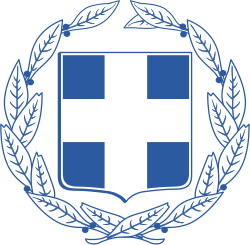Greek legislative election, 1951
 |
| This article is part of a series on the politics and government of Greece |
Parliamentary elections were held in Greece on 9 September 1951.[1] They resulted in an ambivalent outcome, consisting a narrow and pyrrhic, as proven later, victory for the ruling center-liberal parties of Sophoklis Venizelos and Nikolaos Plastiras.
Background
After the Greek elections of 1950, when the divided centrist parties had a clear majority in the Parliament political instability was the main characteristic of the political life in Greece. The subsequent centre-liberal governments of Sophoklis Venizelos, Nikolaos Plastiras and Georgios Papandreou did not manage to ensure and enforce stability. As a result, Nikolaos Plastiras supported a People's Party government, under the terms that the latter would soon conduct elections.
Outcome
First party in the elections of 1951 was the just-founded Greek Rally of Alexandros Papagos, which swept the traditionally dominant right-wing People's Party. Nevertheless, the two major centrist-liberal parties, the Liberal Party and the National Progressive Center Union, elected more deputies than the conservatives.
The left-wing EDA, a party believed to have been affiliated with the outlaw during 1950-1974 Communist Party of Greece, made its first appearance in these elections.
Results
| Party | Votes | % | Seats | +/– |
|---|---|---|---|---|
| Greek Rally | 624,316 | 36.5 | 114 | New |
| National Progressive Center Union | 401,379 | 23.5 | 74 | +29 |
| Liberal Party | 325,390 | 19.0 | 57 | +1 |
| United Democratic Left | 180,640 | 10.6 | 10 | New |
| People's Party | 113,876 | 6.7 | 2 | –60 |
| Georgios Papandreou Party | 35,810 | 2.1 | 0 | –35 |
| Agricultural and Labour Party | 21,009 | 1.2 | 1 | New |
| Socialist Party of Greece | 3,912 | 0.2 | 0 | New |
| List of Independents | 1,554 | 0.1 | 0 | 0 |
| Communist Archio-Marxist Party of Greece | 1,148 | 0.1 | 0 | New |
| Independents | 965 | 0.1 | 0 | 0 |
| Invalid/blank votes | 8,108 | – | – | – |
| Total | 1,717,107 | 100 | 258 | +8 |
| Registered voters/turnout | 2,224,246 | 77.2 | – | – |
| Source: Nohlen & Stöver | ||||
Aftermath
Since no party or alliance had the absolute majority in the Parliament and Alexandros Papagos refused to participate in a government of national unity, the Liberal Party and the National Progressive Center Union formed a minority government under the leadership of Nikolaos Plastiras, which lasted for about a year, since 1952, when Nikolaos Plastiras submitted his resignation and new legislative elections were proclaimed by the King Paul I.